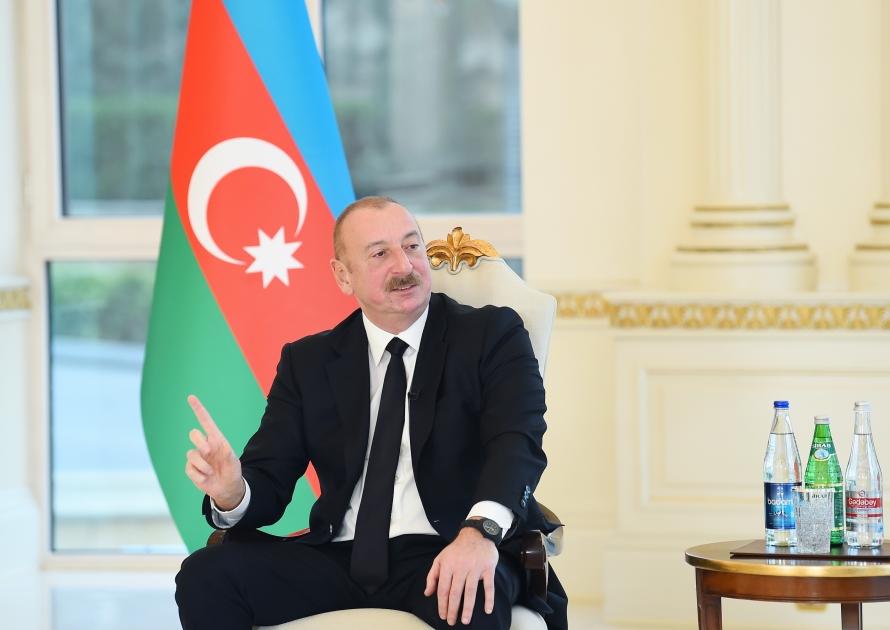Can we find a ray of hope for peace amidst Pashinyan's сunning statements? Armenian PM once again delves into dubious rhetoric
As expected, Azerbaijani President Ilham Aliyev's televised interview with domestic television channels caused a great stir in Armenian society and political circles. As expected, the media and opposition parties began to accuse Baku of aggressive plans against Armenia, without going into the essence of what the Azerbaijani leader said. Some rushed to try to inflame the situation to the maximum, obviously to shatter the power of the hated Pashinyan. It emerged that one of the separatists' former military leaders, Seyran Ohanyan, the author of the "impassable" defence line named after him, had called for preparations for a new war with the eastern neighbour.
Meanwhile, Armenian Prime Minister Nikol Pashinyan also commented on Aliyev's interview and the Armenian-Azerbaijani settlement in general at a meeting with members of the Civil Contract faction.
In general, the Prime Minister has once again demonstrated dubious and imaginary constructiveness. For instance, this statement is remarkable: "Let's sign an arms control agreement so that Armenia and Azerbaijan can reach concrete agreements on arms and have the opportunity to control each other".
It is a very strange statement, obviously intended to silence the following words of Ilham Aliyev: "Armenia should know that no matter how many weapons it buys, no matter how much support it gets, any source of threat to us will be immediately destroyed. I am not hiding this so that tomorrow no one will say that something unexpected happened. Let the listeners hear that if we see a real threat to us, not the ramshackle French 'Bastions', those tin cans, but a real threat, we will destroy that threat in any location with preventive measures." Aliyev's words are a natural warning against any revanchist ideas Yerevan might adopt. At the same time, the Azerbaijani president, being a realist, does not call for the demilitarisation of Armenia, because he knows very well that this is not possible, if only because the Western sponsors of Armenia will not permit it. Indeed, Aliyev, foreseeing that Armenia is likely to arm itself, warns: "It would be better not to do so. Any serious weapons pointed at our borders will be destroyed."

Pashinyan's proposal on arms control tries to portray the conflict as a battle between two evenly-matched opponents, rather than admitting that one side is winning and the other is losing. This approach creates the impression that there is some balance between the two sides, which is why Yerevan is promoting it as a peaceful solution. However, in reality, this is just a hype.
Then, addressing the issue of the functioning of the route from the Azerbaijani mainland to Nakhchivan, Pashinyan put forward the thesis: "Yerevan is ready to provide the same mode of functioning of the corridor as Tehran will provide for Baku." As political scientist Farhad Mammadov noted on the Caliber.Az YouTube channel, "Everything seems logical, but Iran has not lost the war". In fact, Pashinyan "forgets" that he does not need to look back to Tehran on this issue. Unlike the Iranian leadership, he signed the following commitment more than three years ago: "All economic and transport links in the region will be unblocked. The Republic of Armenia guarantees the safety of transport communications between the western regions of the Republic of Azerbaijan and the Nakhchivan Autonomous Republic in order to organise the unhindered movement of citizens, vehicles and cargo in both directions. The bodies of the Border Service of the Federal Security Service of Russia exercise control over transport communications."
We quoted the 9th paragraph of the tripartite declaration. But Pashinyan seems to have an answer to our objection: "Two of the three parties to the Tripartite Statement, from the moment it was signed until September 2023, have indeed shown that this document does not exist for them. It cannot be that the document exists for one party but not the others."
Here's another interesting quote: "Unfortunately, Armenia and Azerbaijan had so far spoken different diplomatic languages. There are and will be forces in both Armenia and Azerbaijan and outside our states that are not interested in peace, but here the position of the leaders of the states is of great importance". This seems to be in line with what Baku is saying. The only problem is that (apart from the aforementioned obligation to host the Russian Peacekeeping Contingent until 2025) we, referring to third powers, are free from obligations towards them. Yerevan's talk about the intrigues of third powers is first of all an attempt to deny its obligation to Russia under the 9th point of the trilateral declaration to ensure control over the Zangezur corridor. And presenting the case as if nothing had happened is, at the very least, unconstructive. In this sense, Baku and Yerevan are not exactly "in the same boat".
Despite the obvious desire to challenge Aliyev's theses at all costs, the fact that Pashinyan has not made any loud statements about the failure of the negotiations is nevertheless encouraging. Yes, there are disagreements on several issues, in particular the functioning of the Zangezur corridor, delimitation and border demarcation. Nevertheless, one gets the impression that Yerevan is trying to limit the scope of discussion after a framework peace agreement has been reached, rather than trying to prevent it.








